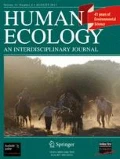Abstract
Klausner has hypothesized that female-headed households are less efficient in the use of energy than male-headed households because they are less “disciplined” and “ordered.” The present study used multivariate analyses to determine whether female-headed households were less efficient in the use of electrical energy than male-headed households in a representative sample of 4638 Anglo, Spanish-speaking, and black homeowning Texas households. The results indicated that, after controlling for the effects of other variables known to affect the use of electricity, sex of household head had nostatistically significant independent effect on electricity consumption in any ethnic or marital status group. The authors compare their results to those obtained by Klausner and discuss implications for social organizational theory of household energy consumption.
References
Cunningham, W. H., and Lopreato, S. C. (1977).Energy Use and Conservation Incentives. Praeger, New York.
Fowler, J. W. (1975).Energy-Environment Source Book. National Science Teachers Foundation, Washington, D.C.
Klausner, S. Z. (1977a). Energy and the structuring of society: Methodological issues. In Altman, I., and Wohlwill, J. R. (eds.),Human Behavior and Environment: Advances in Theory and Research, Plenum, New York.
Klausner, S. Z. (1977b). Energy shortages and the poor. Paper presented at the University of Houston Conference on Social and Behavioral Implications of the Energy Crisis, Houston, Texas, June 22.
Klausner, S. Z. (1978a), Household organization and use of electricity: From macrosociology to the behavior of households. In Warkov, S. (ed.),Energy Policy in the United States: Social and Behavioral Dimensions, Praeger, New York.
Klausner, S. Z. (1978b). Personal communication to the authors, Center for Research on the Acts of Man, Philadelphia, August 21.
Klausner, S. Z. (1979). Social order and energy consumption in matrifocal households.Human Ecology 7: 21–39.
Newman, D., and Day, D. (1975).The American Energy Consumer. Ballinger, Cambridge, Massachusetts.
Warkov, S. (1977).Fact Book on Major Texas Utilities and the Household Sector: A Socioeconomic and Demographic Profile. University of Houston Energy Institute, Houston, Texas.
Warkov, S., and DeFronzo, J. (1979). Role differentiation: A study in the micro sociology of household energy consumption. Paper in preparation, Department of Sociology, University of Connecticut, Storrs, Connecticut.
Author information
Authors and Affiliations
Rights and permissions
About this article
Cite this article
DeFronzo, J., Warkov, S. Are female-headed households energy efficient: A test of Klausner's hypothesis among Anglo, Spanish-speaking, and black texas households. Hum Ecol 7, 191–197 (1979). https://doi.org/10.1007/BF00917521
Issue Date:
DOI: https://doi.org/10.1007/BF00917521

